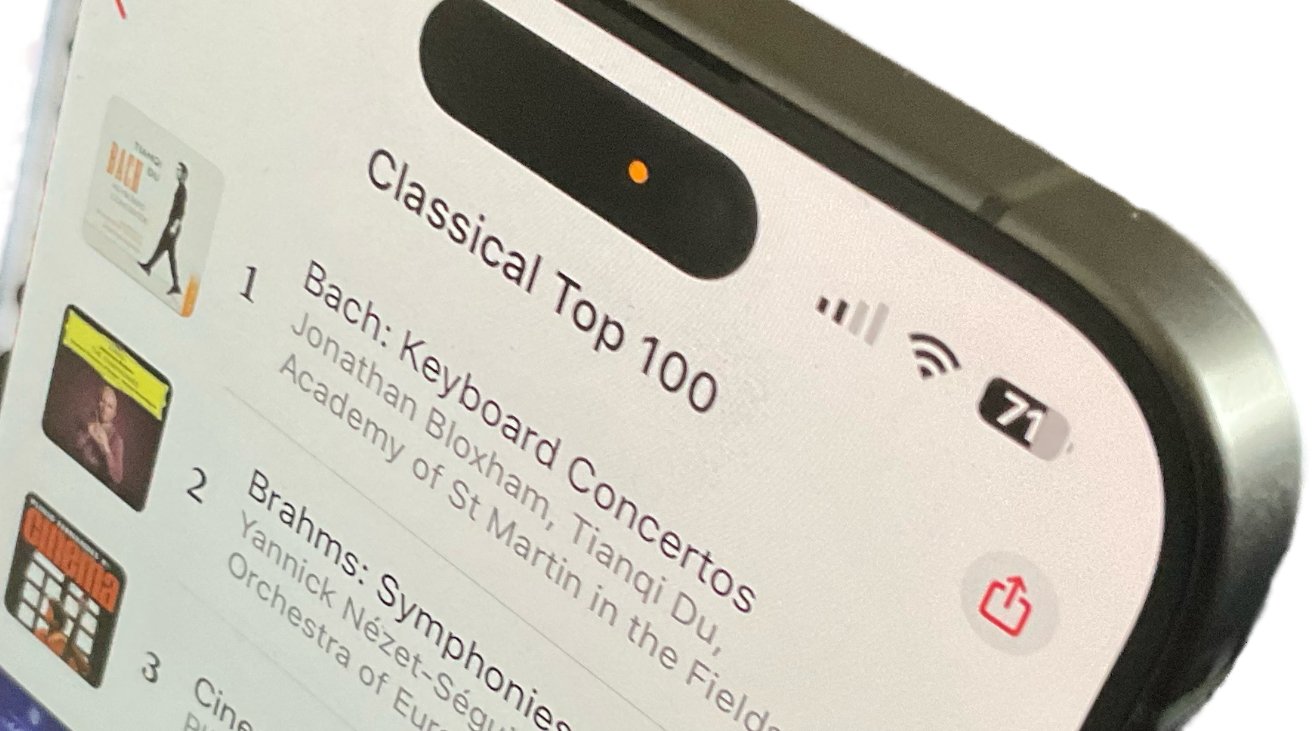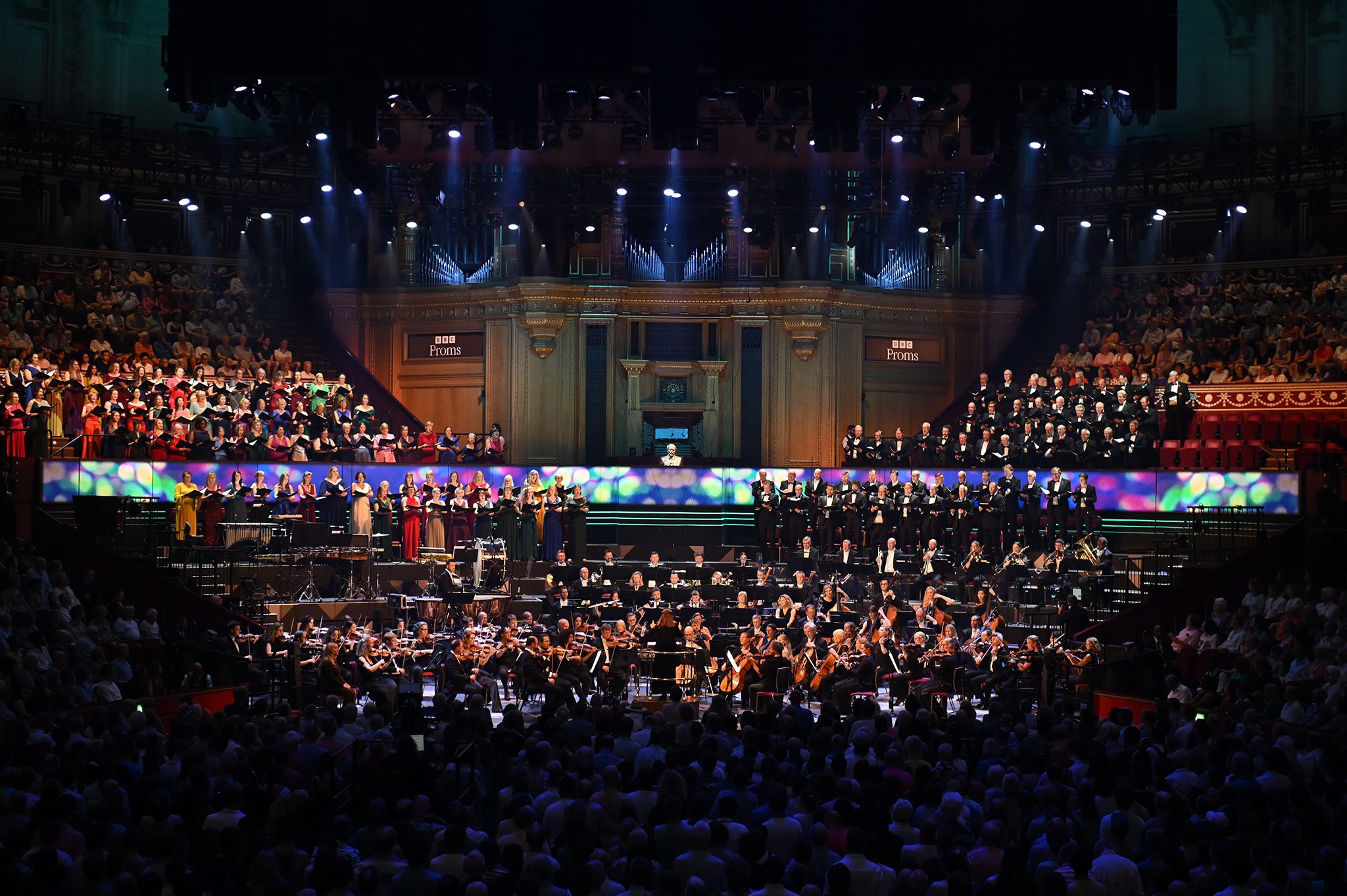My penultimate night at the Royal Albert Hall made good on a one-day travelcard that took me to Windsor for a podcast with a member of the Queen’s Six, then onto the Royal College of Music for some meetings. Two Proms: Czech Philharmonic play Smetena, Tchaikovsky, and Shostakovich, followed by the much-anticipated Jonny Greenwood Late Night Prom.
These kind of nights are fascinating at the RAH because they highlight a transition between audiences. Get here early enough in the evening pre-concert and watch empty public spaces swell with a wide variety of people in anticipation of the performance. Dungarees, cycling shorts, and retro prints mingled in amongst man buns, suits, and biros in amongst dreadlocks.
Newcomers clearly irritated by the ‘no flash photography’ rule reiterated by a seasoned prommer during the first Prom who later left mid-Greenwood Prom, provided a fresh insight for me. For some potential concert-goers an early evening Prom and a Late Night Prom can be seen an entire evening’s worth of varied entertainment.
As the audience poured out of the doors post-Czech Philharmonic, so the crowd for the Late Night Jonny Greenwood Prom strode and shuffled in. Longer hair, fresher-faced, some donning sharp threads and a well-turned boot. The change in energy was palpable. I note the ankle length denim turn-up white plimsoll combination remains a popular choice.
The Greenwood Prom had much to live up in part down to the hype surrounding it but also because of what came before it. Spoilers: it didn’t.
Czech Philharmonic
The Czech Philharmonic were on blistering form from beginning to end, one of only a handful of international orchestras who fizz the moment they’re on stage. In my experience, overtures provide a useful entree for the band to get used to the acoustic with the audience contirbuting to it, meaning the overture can sometimes be the least ‘alive’ moment in the programme.
Not so during the Czech Phil’s Bartered Bride overture. Conductor Semyon Bychov brought out the score’s verve, charm and pride. Razor thin upper strings that reveled in the gaps in between notes combined with ever more buoyant pedal notes in the cellos and basses gave the work life, elegantly building tension before the principal theme soared.

The Czech Phil’s string section brought an impressive range of colours and textures throughout the Smetana – the sight of the leader and number 2 in the first violins exchanging winks and smiles during the Dance of The Comedians ramped up the excitement and brought the excerpts to a rousing and uplifting conclusion. There is a lot going on in the orchestra – during these bravura movements which makes this a technicolour kind of experience for orchestration nerds. But those of enthralled by woodwind players mirroring their string playing colleagues with scales and flourishes, providing the musical icing on an already ornate cake, the Czech Philharmonic wind section met the challenge handsomely.
That same commitment to discipline, range, and precision in the strings was front and centre in the second half 8th symphony by Shostakovich.
Some favourite moments in the performance follow. By the end this felt like drama carved out something very hard leaving us with a considerable musical edifice. I’m not sure I’ve heard a performance of a Shostakovich symphony that’s had quite so much dramatic impact on me since hearing the Lenningrad for the first time. But then, memory is a bit of a bugger for that kind of hyperbole, it has to be said.
So, the things to listen out for.
The opening quiet string subject – a single voice played across multiple strings with little discernible movement but strength and determination – created a theatrical contrast that silenced the auditorium. There is an emotional quality to the material which is difficult to pinpoint. It’s not fear, and its not defiance. There’s a sense of strength in it which is utterly compelling. Also impressed by how, almost imperceptibly, Shostakovich scores a flute and muted trumpet to track the melody in the first and second violins during the opening subject. It is a joy to observe.
Barking basses underpinned a taut terrifying and ostinato in the first and second violins (and later the violas). Relentless, unequivocal, never-want-it-end kind of stuff. Thelower brass mirroring the originating idea was something to behold. Bychov’s vocal encouragement (audible on the radio broadcast) topped the whole thing off with a satisfying dollop of terror. And frankly, who wouldn’t want to play that timpani solo (1:44 on iPlayer Radio)?
Stunning control in the principal trumpet line – especially in the high notes of the fourth movement, and a captivating solo from the cor anglais player. Interesting to observe how at points in the solo line Shostakovich blends a clarinet (and possibly flute) with cor anglais doubling the melody for added intensity.
And the pizzicato conclusion to the final movement is the most crushing thing I think I’ve ever heard.
Daniel Pioro & Jonny Greenwood
Billed as the Jonny Greenwood Prom (fair enough there are two works by the Radiohead bass player one of which was a world premiere), I was keen to attend to see Daniel Pioro play. His Wigmore Hall appearance earlier in the year was a jaw-dropping thing for me. I do think he is a remarkable player who is going to be heard and seen a whole lot more and I hope that we seem in a range of different places too.

Interestingly, there was a different reverential vibe in the auditorium compared to the sometimes hotch-potch brusqueness of the classical music ‘regulars’. Touching. Rather sweet. But let’s not make the assumption that other audience groups don’t do reverence. They absolutely do.
Pioro opened with a solo sonata by Biber. Arguably the bigger sell and the impressive realisation too. A daring move, a bold statement and a fearless performance that left the curious expectant audience motionless. Seguing to Penderecki’s String Ensemble was a deft move giving the concert, mercilessly devoid of an on-stage presenter, a decidedly playlist feel. Some confusion was evident on the faces of the audience members in the row in front of me in the stalls, who seemed to find the inclusion of Penderecki’s music bemusing and, at times, even amusing.

Greenwood’s Water, although a Herculean effort for the pianist lacks a much-needed narrative, established atmosphere but narratively speaking didn’t move beyond it, meaning it risked appearing a marathon of technical endurance rather than an reflective experience for the listener. It didn’t move me. Maybe it wasn’t intended to. It just irritated me.
Those closer to the stage or listening on the radio will have got a more satisfying mix of Reich’s Pulse. In Row 6 Door J, the clarity that drives Reich’s repetitive cells fell victim to the Albert Hall’s boominess. Certainly, listening back on iPlayer Radio this morning, it was an ensemble primarily configured for radio and TV broadcast rather than being an auditorium experience.
As the concert was overrunning, I needed to leave after the Reich. This as it turned out resulted in a better listening experience when I came to listen to the premiere back on iPlayer Radio.
Greenwood’s music (like the Reich as it turns out the morning after) is a studio-like listening experience. His new work Horror vacui for solo violin and 68 strings contained a cracking extended cadenza (or an entire movement?) for Daniel Pioro which was for me the most compelling element in an unexpectedly long work. There were some interesting and appealing soundscapes and a greater sense of narrative, but it didn’t quite resonate for me in the way I assumed it would given the anticipation around the event.
On reflection, this felt like a strategic concert – an ‘audience builder’ banking on the Greenwood name and past collaborations, welding a fanbase and radio audience (6 Music) to the BBC Proms with a playlist-esque offering that was big on experience but light on substance.
It was also a big opportunity for BBC NOW to firmly align itself with modern, ambient ‘Unclassified’ content, distancing itself from its Doctor Who soundtrack days. From this perspective raising awareness of the event including those aligned properties (BBC NOW + Greenwood) will be paramount in framing not only the artists, but reframing perceptions of the wider Proms season.
Reflecting on the concert more this morning, I think the concert was conceived primarily for radio and television (hence why the Reich sounded better via broadcast). In that way, I’d have liked to see Daniel pair up with the Manchester Collective on a much-punchier programme of the kind I experienced at CLF Cafe and King’s Place earlier in the year, a collaboration which would have yielded more content and highlighted some of the creative forces Adam Szabo and his team at Manchester Collective team surface.



